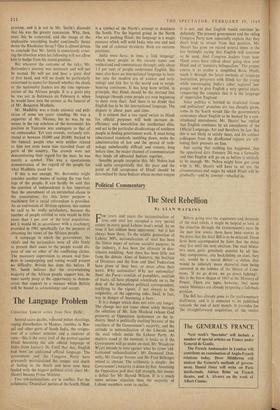The Language Problem
CilANCHAL SARK AR writes from Neu, Delhi: Several score deaths, repeated police• shootings, raging disturbances in Madras, rumbles in Ben- gal and other parts of South India, the resigna- tion of a cabinet minister and a minister of state—this is the sorry trail of the protest against Hindi becoming the sole official language of India from January 26. Until that day, English had been an additional official language. The government and • the Congress Party have grievously miscalculated the temper and depth of feeling in the South and have now been landed with the biggest political crisis since Mr. Shastri became Prime Minister.
Two sub-nationalisms are in conflict. For the isolationist 'Dravidian' parties of the South, Hindi is a symbol of the North's attempt to dominate the South. For the bigoted group in the North who are pushing Hindi, the language is a magic panacea which will weld India into one and seal the end of colonial thraldom. Both are extreme positions.
India must have, in time, a 'link language' which most people in the sixteen states can understand and communicate through; only about 1.5 per cent of people understand English. She must also have an international language to lever her into the modern era of science and tech- nology and link her to the world and to neigh- bouring continents. It has long been settled, in principle, that Hindi should be the internal link language (though some people are now beginning to deny even that). And there is no doubt that English has to be the international language. The dispute is about pace and .time.
It is evident that a too rapid switch to Hindi for official purposes will both increase in- efficiency and immobilise the intellectual elite, and act to the particular disadvantage of southern people in finding government work. It must bring educational standards tumbling down, make the administration of law and the spread of tech- nology unbelievably difficult and remove, long before time, the major channel of communication that binds all educated Indians together.
Sensible people recognise this. Mr. Nehru had said quite categorically that the pace and the point of full acceptance of Hindi should be determined by those Indians whose mother-tongue it is not, and that English would continue in- definitely. The present government and the ruling Congress Party now repeatedly explain that they don't wish to retreat from that position. Mr. Shastri has gone on record several times in the last fortnight saying that English will continue to be used. And Congress leaders from non- Hindi areas have talked about going slow over Hindi and of 'statutory bilingualism.' The proper course is to evolve a simplified Basic Hindi, teach it through the latest methods of language instruction, persevere with Hindi for the young while encouraging India's other regional lan- guages and to give English a very special place, conquering the complex that it is the language of imperialist England.
Since politics is hitched to irrational forces and politicians' promises are too cheaply given, some in the South would like• the government's assurances about English to be backed by a con- stitutional amendment. Mr. Shastri has replied that English continues by an amendment of the Official Languages Act and therefore by law. But this is not likely to satisfy them, and his cabinet colleagues from the disaffected regions are stif- fening their pressure on him.
Just saying that nothing has happened, that the appointed date (January 26) was a formality and that English will go on as before is unlikely to be enough. Mr. Nehru might have got away with it. Mr. Shastri will have to set out the circumstances and stages by which Hindi will be gradually—and by consent—wheeled in.


































 Previous page
Previous page